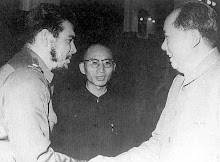attacking Chinese justice
 From 1839 to 1842 Britain went to war with China to force it to
From 1839 to 1842 Britain went to war with China to force it toaccept the opium which Britain was pumping into the country
The Scotsman
Dec 31 2009
George Kerevan
IN ITS imperial heyday, the sun never set on the British
Empire. Of course, as the Irish were wont to point out,
that was only because God did not trust the British in the
dark. These days, most Britons have forgotten the empire,
except as a backdrop for BBC costume dramas. The rest of
the world is not so accommodating, having borne the brunt
of our uninvited foreign adventures.
A case in point is Chinese anger at Britain's outspoken
public criticism of the execution on Tuesday of a UK
citizen, Akmal Shaikh, who was convicted of drug smuggling,
despite claims he was suffering from bipolar disorder, a
form of manic depression. Shaikh's execution went ahead
despite voluble calls from the British government for
clemency. The Foreign Office minister Ivan Lewis lectured
the Chinese ambassador to her face that "China had failed
in its basic human rights responsibilities".
I have no personal knowledge of Shaikh, though there seems
to be no opposition to the fact that he was caught
red-handed smuggling four kilos of heroin into Urumqi, the
largest city in China's western interior. Urumqi is the
centre of the heroin trade in China, owing to its proximity
to Afghanistan and Pakistan - a dangerous place to be.
Shaikh's family say he was duped into transporting the
drugs as a direct result of his illness - they claim he was
prone to violent mood swings and delusions that diminished
his sense of responsibility. However, while it could be a
result of a chemical imbalance in the brain, there are no
medical tests for the condition. Diagnosis is made solely
on the basis of symptoms - mild or serious. Diagnosis can
be problematic, especially if episodes are intermittent.
Yet there is a strong association between bipolar disorder
and what society deems to be criminal behaviour. The US
department of justice reports that 16 per cent of all
inmates in state and federal jails have a severe mental
illness, particularly bipolar disorder. On the other hand,
the link between manic depression and "wrongdoing" tends to
be through self-harm or violent, psychotic episodes rather
than organised crime. I am not in a position to judge the
rights and wrongs of Shaikh's case. He does seem to have a
history of delusional behaviour. However, I do worry that
British politicians and the media are sometimes too ready
to accuse foreign governments of incompetence, bias or lack
of elementary human rights when dealing with UK citizens
who have broken local laws.
There was the case of the three NatWest bankers extradited
to the US in 2006 on fraud charges linked to the Enron
scandal. A huge media campaign was mounted against this
"fast-track" extradition and many crocodile tears were shed
regarding the fate of the bankers in a "politicised" US
court system. Strangely enough, once in the US the trio
admitted their guilt and accepted a modest 37-month jail
sentence, which they actually served in Britain.
Attacking foreign jurisdictions for being legally
incompetent when dealing with British citizens makes for
good headlines in the UK. But it can make matters a lot
worse for the accused, especially if those foreign nations
feel they are being patronised by British politicians who
have short memories about what Britain got up to in its
imperial past.
Look at the case of Akmal Shaikh through Chinese eyes. The
execution and the British reaction are big news in the
local media. Ever polite, the Chinese have refrained from
mentioning the two wars we fought in the 19th century in
order to force China to let British (and Scottish)
merchants export opium to that country - an intervention
that plunged China into anarchy. Only now, 140 years later,
has China returned to its rightful place in the global
community, but the psychological scars run deep. It is no
surprise, then, that the Chinese will not take lectures
from Ivan Lewis.
The Chinese foreign ministry makes the obvious point that,
for years, Britain has accused China of lacking the rule of
law and an independent judiciary. But now the Chinese are
trying to establish the independence of their courts, we
suddenly want the Chinese government to set aside their
verdict for a foreign national.
Whatever the rights and wrongs of the Shaikh execution, the
strident form of the British protest comes across to
ordinary Chinese as both hypocritical and racist. We can
disagree with their reaction, but we should not ignore it.
The Chinese maintain that Shaikh enjoyed due process,
including two appeal trials after his original conviction.
They argue that, while the British authorities demanded a
psychiatric evaluation of Shaikh, they did not provide
sufficient detailed medical evidence (other than hearsay)
to convince the Chinese Supreme Court that it should take
such a step.
Had it been up to me, I would not have executed Shaikh. My
point is different: I am worried that he has been turned
into a pawn in a domestic power game designed to "prove"
British politicians are more important in the world than
they really are.
Yet when Gordon Brown lectures Hamid Karzai about
corruption in Afghanistan, ordinary Afghanis think about
British MPs and duck ponds. When we denounce miscarriages
of justice abroad, we should remember with shame the
Guilford Four, the Maguire Seven and the Birmingham Six -
proof of racism towards the Irish that infected the British
justice system throughout the 1970s.
In 1952, Derek Bentley, a 19-year-old petty thief, was
under arrest when his accomplice, Chris Craig, shot a
police officer. Craig escaped the gallows because he was a
minor, but Bentley was hanged. It took just 88 days from
the shots being fired till Bentley was executed. In 1998,
the Court of Appeal cleared his name, declaring he had been
denied "the fair trial which is the birthright of every
British citizen". Bentley had a mental age of 11. Let him
without sin cast the first stone. Or, in modern terms: the
successful diplomat is not necessarily the one who shouts
loudest.




No comments:
Post a Comment